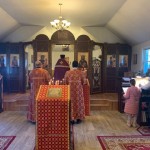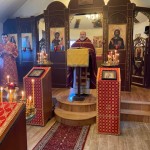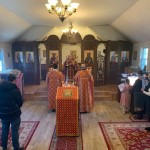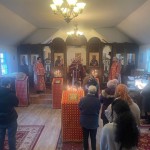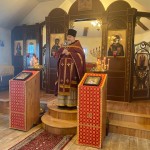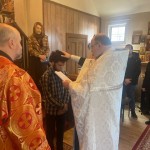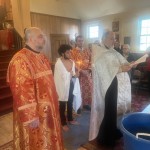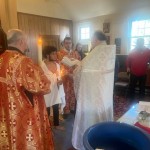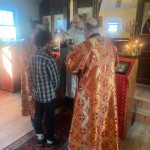On December 12, on the 25th Sunday after Pentecost, our Parish family gathered for a nice celebration. Our Rector, Archpriest Igor Tarasov performed the Divine Liturgy in our St. George Church. After the reading from the Holy Gospel he preached the following homily:
“Dear brothers and sisters in Christ! Today’s Gospel tells us about a miracle of healing performed by our Lord Jesus Christ over a sick woman. She had a spirit of infirmity 18 years, and was bent over and could not raise herself up (Lk. 13, 11). As in many other instances when our Lord healed the people, He had compassion, He felt for this woman, thus He called her and said, “Woman, you are loosed from your infirmity” (Lk. 13, 12). He laid His hands on her, and immediately she was made straight, and glorified God (Lk. 13, 13). We should recall that St. Luke whose Gospel we read today, was a physician, therefore he attempted to describe people’s illnesses with precision”.
“If we were present there at that glorious miracle of the Lord, we would probably rejoice for the woman who was healed and for the glory of God revealed. But the reaction of some people present there was different. We read that the ruler of the synagogue was not happy because Jesus had healed on the Sabbath. So, the ruler said to the people that they may come to be healed on the other six days, but not on the Sabbath. In such a reaction we see a very formal and superficial observance of the law of Moses. The ruler of the synagogue, as well as all the Pharisees and scribes, kept the letter of the law, instead of the spirit of the law. Such an observance can still be seen in the orthodox Jewish communities. In this city of New York, if you go to certain neighborhoods populated by the religious Jews, like Borough Park or Williamsburg, you can see that they observe Sabbath and other different rules very meticulously. These people do not drive their cars and do not use the elevator on the Sabbath. If you analyze that, you may find that they are very specific about keeping lots of rules and continue what the Pharisees did in the times of Jesus being on the earth”.
“Thus, these people, as well as their ancestors mentioned in today’s Gospel, keep the letter of the law, not the spirit. This is why the Lord called them hypocrites. He said, “Does not each one of you on the Sabbath loose his ox or donkey from the stall, and lead it away to water it?” (Lk. 13, 15). Certain things should be done no matter whether today is Sabbath or any other day. Especially, good deeds of mercy should be performed on each day. Furthermore, Jesus wishes us to understand that such works of love and charity should especially be done on the holy days. Good Christians understand that. We are also called to keep Ten Commandments, to honor and sanctify the Sabbath. For us Sunday is our Sabbath, the holy day of the week, the day of rest and the day of worship. However, we cannot think that a miracle could not be performed on such a day. We further cannot imagine that works of mercy could be prohibited on Sunday. In addition, we agree that certain jobs like emergency help or works necessary for your life or health may be done on Sunday”.
“Of course, on Sunday you should not do any physical work, you should and you have to go to the church. If you are working on Sunday because you want to and you want to make more money – you do commit a sin. But if you have to perform an emergency work, you can do it on Sunday. And people who are on duty on Sunday, like police officers or firefighters – they do not sin when they work on their Sunday shifts”.
“This is why today’s Gospel teaches us to observe the spirit of the God’s law, not just the letter of it. We have to live by our faith, and not just show that we are so religious. Our piety has to show what is in our hearts. Otherwise we risk to become similar to the Jewish scribes or Pharisees who demonstrated their piety and zeal in external observance of the rituals, but inside of their hearts were evil. Our Lord called them “whitewashed tombs which indeed appear beautiful outwardly, but inside are full of dead men’s bones and all uncleanness” (Mt. 23, 27). Jesus warned His disciples from the “leaven of the Pharisees which is hypocrisy” (Lk. 12, 1)”.
“We may ridicule the orthodox Jews but we have to admit that we may see similar attitude among us, Orthodox Christians. Sometimes we also keep the letter of our faith, not its spirit. Being recently in Ukraine, I met a man who was in pain. He has a problem with his spine. When I spoke with him, he complained that he was suffering the whole night. But, as he told, he could not take the pain killers because he was supposed to receive Communion. I was a little surprised and told him that taking medicine with some water in such a case would not break the Eucharistic fast. But he said, “No, you in America can do that. We here are strict in our piety”. So, what do we see? A person suffers because he thinks he cannot break the fast before Communion. But it is permissible to take medicine if you are sick. It is permissible to take the pain killers if you are in pain. It is permissible to drink some water if you need it for medical reasons. We are not talking about eating a breakfast. But even some breakfast is allowed to the people having high blood sugar. In the large parishes, where an early Liturgy is celebrated, such people can come for Communion very early, and then they would keep the fast. They can eat breakfast after the early service. But in a parish like ours, we have only one Liturgy, so if someone has diabetes and needs to eat something in the morning, such person may be blessed to do so before Communion. Again, the spirit of our faith should be observed, not the letter.”
“The spirit of the law is found in the whole works of divine grace. The healing, life-giving, renewing power of God, His grace has no limits. It cannot be limited to the certain days, to the certain places or certain nations. It acts everywhere. And we have to be joyful to receive it and to see it at work. This was the purpose of the Lord to come into this world, that His grace may be shed upon every person. As a sign of that Jesus Himself cured all the infirmities and diseases among the people whom He encountered in pain. And the whole human race had to be healed, made well and straight the way the Lord healed and made straight the woman in today’s Gospel. Thus, dear brothers and sisters, let us be grateful and adhere to His commands, fulfilling first of all the spirit of His law, to be worthy of His eternal ruling”.
During the Litany of Fervent Supplication, Fr. Igor proclaimed a petition beseeching the Lord to spare the faithful from the outbreak of the disease.
During preparation for Holy Communion the choir prayerfully performed the pre-Nativity hymns from the Christmas canon.
After the dismissal of the Liturgy the Rector addressed again the importance of fulfilling the spirit of our faith in religious life, not the superficial observance of the rules. Especially now, during the Nativity Fast, such issues arise. People ask how should they fast, what should they eat. Of course, trying to keep the canons and regulations of our Church, we have to understand that the most important thing in fasting is to spiritually attune to the works of salvation. The Rector also made some announcements regarding coming feasts.
Following the Liturgy the Rector performed the Mystery of Baptism over Johnmark Deleon who desired to convert and to join the Holy Orthodox Church. In the Holy Baptism he was given the name Mark. Following the Sacraments of Baptism and Chrismation Mark received his first Holy Communion. The Rector then congratulated him on that very solemn and important occasion.

